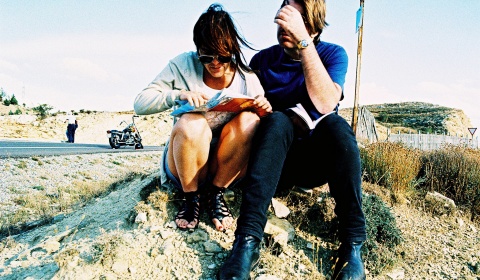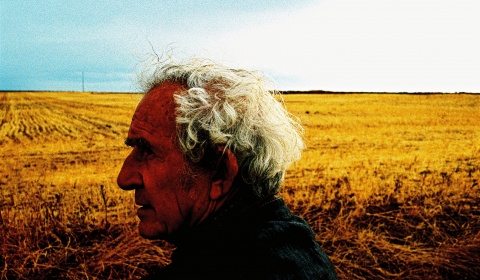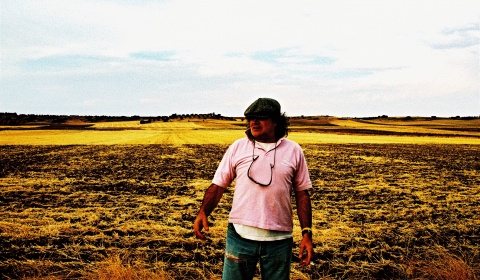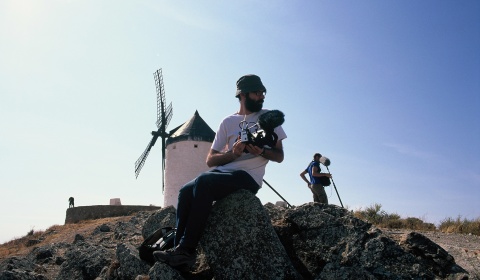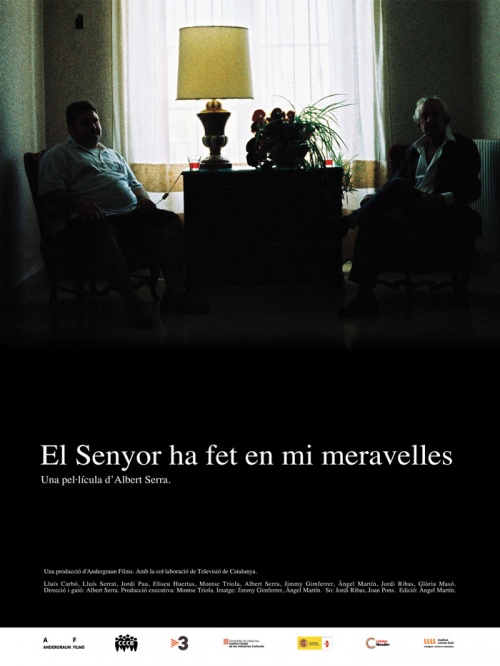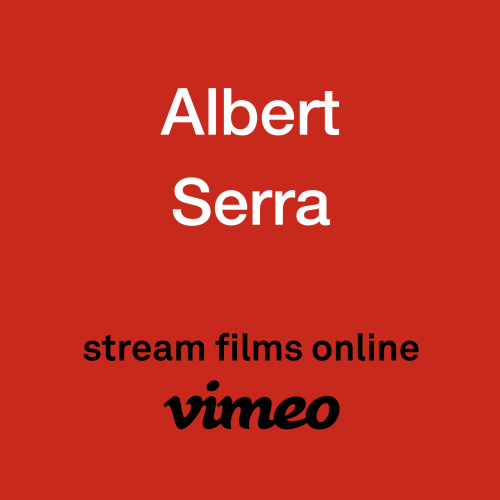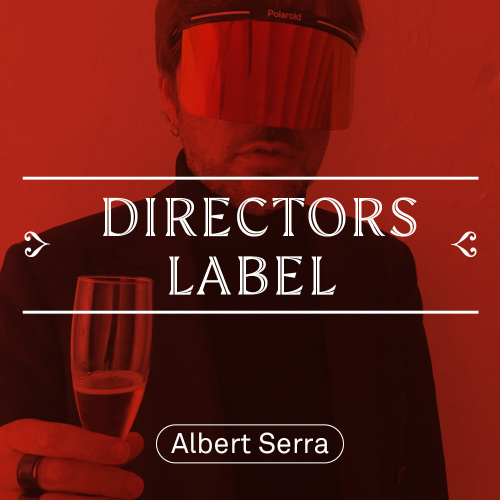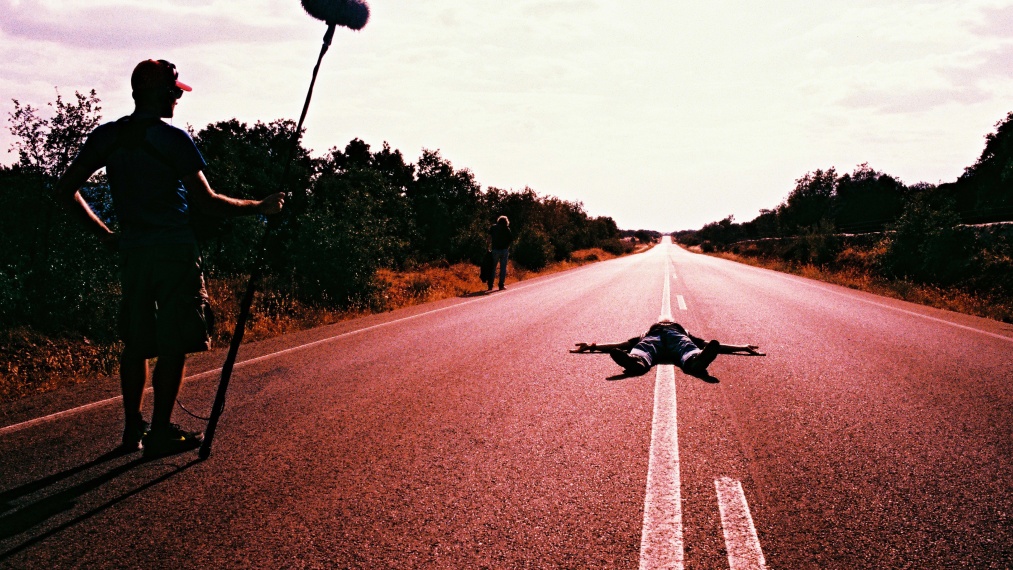
The Lord Worked Wonders in Me
EL SENYOR HA FET EN MI MERAVELLES, Spain 2011, 146 min
A road movie – on the trail of Don Quixote's mythical locations.
Synopsis
As part of a project for the Centre de Cultura Contemporània de Barcelona, Albert Serra and Lisandro Alonso agree to exchange filmed letters where both engage with their previous works. Part of the crew of HONOUR OF THE KNIGHTS travels to La Mancha to see the real settings of Don Quixote's life in order to shoot a new film. When they realize that the landscapes no longer exist, they start filming the interior of the hotel or their van. The film is partly a portrait of his collaborators and crew, partly a reflection on filmmaking and on the changing landscapes of contemporary Europe.
Streaming-Info
Rent or buy the movie on our Vimeo channel. For other providers, see “Watch Movie”.
Language: Catalan, Subtitles: German, English
Press reviews
The Lord Worked Wonders in Me began as an attempt to rediscover the mythical landscapes of La Mancha from Cervantes’ Don Quixote. Together with the cast from Honour of the Knights, Serra and his crew arrived to discover the landscapes no longer existed and set about instead making work about the making or in this case un-making of a film. This unique film is part portrait of his collaborators and crew, part reflection on the changing landscapes of contemporary Europe.
The film was a chance for Serra to explore one of his underlying themes that of play and fun. As he has stated this element, the ‘ludic side of the way I work is hidden in my previous films because of their formalism, but it’s an important element for me: it’s why I decided to make cinema, for fun, to make a break with routine daily life, which is getting more mediocre all the time. Cinema was a way of escaping this. Cinema is a social art that creates a certain ambience; it’s work but there’s also the element of friendship and family.’ – Tate Modern
There are echoes of Truffaut’s Day for Night in the appealing simplicity of Serra’s approach. The Lord Worked Wonders in Me, however, is more than just a film about filmmaking. Lyrical absurdism, an uncompromising cinematic vision and the attention to composition evidenced in his earlier features all combine to provide a commentary on 21st-century quest with earlier antecedents. – Institute of Contemporary Arts (ICA)
Awards and Festivals
- Locarno International Film Festival 2011
- The Times BFI London Film Festival 2011
- Festival Internacional de Cine documental y cortometraje de Bilbao 2011
- Lisbon & Estoril Film Festival 2011
- Jihlava International Documentary Film Festival 2011
- CPH:DOX (Copenhaguen International Documentary Film Festival) 2011
- Jeonju International Film Festival 2012
- 14 Journées Cinématographiques Dionysiennes, Utopia l’Ecrán Saint-Denis 2014
- Indiefestival Belo Horizonte 2014
- Indiefestival Sâo Paulo 2014
- Arsenal – Institut für Film und Videokunst, Berlin
- Pera Museum, Istambul 2014
- Centre George Pompidou, Paris 2013
- Jihlava International Documentary Film Festival 2015
- Tate Modern, London 2015
- Contour 7 - A Moving Image Biennale, Mechelen 2015
- Jihlava International Documentary Film Festival 2016
- New Horizons International Film Festival-Wroclaw 2019
Additional Texts
Albert Serra talks to Kieron Corless about "The Lord Worked Wonders In Me"
Excerpt, Sight & Sound magazine, 8 July 2015
On the ‘Correspondence’ project
The idea was it should be like the others in the series (Kiaorastami/Erice, Guerin/Mekas). You send one letter, the other answers, and so on. But Lisandro and I are friends; none of the others knew each other before. We did, so it wasn’t about communication in our case, it was more about aesthetic affinity, and friendship. So we just decided to go deeper into our own aesthetics, and make our work in as honest a way as possible.
It seemed childish to make small pieces; I wasn’t interested in what Lisandro was doing now. In the other couples, they are fake friends; they are trying to make this masquerade of communicating something, a masquerade of friendship.
The idea for me was to make a free film, and the commissioners said ‘Okay, just do what you want; it will be one letter.’ I originally sent Lisandro a three-and-a-half-hour first cut, without subtitles, and he said, ‘Fuck, this is not a letter, it’s a monologue!’
On his own filmed ‘letter’, The Lord Worked Wonders In Me
In my case it was having the possibility to show the things I hadn’t been able to before in my films, because of aesthetic pressure or because they were deemed improper. The ludic side of the way I work is hidden in my previous films because of their formalism, but it’s an important element for me: it’s why I decided to make cinema, for fun, to make a break with routine daily life, which is getting more mediocre all the time. Cinema was a way of escaping this. Cinema is a social art that creates a certain ambience; it’s work but there’s also the element of friendship and family.
But I also wanted to bear witness to something in this film – to a way of making films that is perhaps disappearing, because cinema is not financing this kind of approach, these kind of festival films, any more. Showing long works is important nowadays. I’m tired of stupid little things. I like to make something long, that requires time. I like to feel time, duration. Cinema should be this, making perception of time and space more intense. Daily life can’t allow this intensity of perception, of beauty. Cinema can make this happen, and for me this is essential.
On how this film differs from his other films
When you edit a feature film, you always ask yourself, ‘Will this work?’, and when you ask that you’re not thinking just of yourself but of the global concept of the film. You’re not thinking of the audience, exactly, but whether the film will be better or worse.
In this film my idea was to avoid this and follow my own taste. It’s a joke ‘making of’ of all my previous features, and my future ones too, I hope. You never see a camera. You never know who is controlling the point of view; sometimes you have the sense that there’s no-one behind the camera, that it stands alone. You realise after a while that the film being shot is in fact the film you are seeing.
Credits
Director and Screenplay
Albert Serra
With
Lluís Carbó, Lluís Serrat, Jordi Pau, Eliseu Huertas, Montse Triola, Albert Serra, Jimmy Gimferrer, Àngel Martín, Jordi Ribas, Glòria Masó
Director of Photography
Jimmy Gimferrer, Angel Martín
Editor
Àngel Martín
Sound
Joan Pons, Jordi Ribas
Executive Producer
Montse Triola
Produced by
Andergraun Films
In Cooperation with
Televisió de Catalunya
Distribution Details
Screening Format
DCP (2K, 25 fps, 5.1)
Blu-ray Disc
Aspect Ratio
1.85:1
Language
Catalan
Subtitles
German, English
Promotion Material
Digital images
License Area
Germany, Austria, Switzerland
Rating
Not yet been checked


